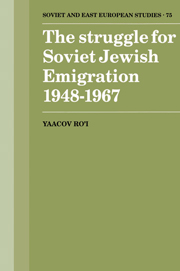Book contents
- Frontmatter
- Contents
- Preface
- Acknowledgments
- Glossary
- List of abbreviations
- Introduction
- PART I
- PART II
- 4 The outside world becomes aware of the problem
- 5 The campaign in the West gathers momentum
- 6 The outside world takes up the issue: 1963–1967
- PART III
- Conclusion
- Notes
- Bibliography
- Index
- Soviet and East European Studies
5 - The campaign in the West gathers momentum
Published online by Cambridge University Press: 31 October 2009
- Frontmatter
- Contents
- Preface
- Acknowledgments
- Glossary
- List of abbreviations
- Introduction
- PART I
- PART II
- 4 The outside world becomes aware of the problem
- 5 The campaign in the West gathers momentum
- 6 The outside world takes up the issue: 1963–1967
- PART III
- Conclusion
- Notes
- Bibliography
- Index
- Soviet and East European Studies
Summary
In late 1956 and early 1957 the Israeli office responsible for dealing with the Soviet Jewish problem set up a more-or-less permanent unofficial committee to create policy regarding how the campaign was to be conducted in the Western world. In addition to Shaul Avigur and Binyamin Eliav, the committee comprised Nahum Goldmann in his dual capacity as president of the World Jewish Congress (WJC) and the WZO; Israeli Foreign Ministry Assistant Director-General for Jewish Affairs Abraham Harman, who became head of the Jewish Agency Information Department in 1957; and Israeli Foreign Ministry East European Department head Arye Eshel.
One of the group's first decisions was to mobilize associates in Paris, London and New York, the key centers for the dissemination of information. Eliav found Meir Rosenhaupt (later Rosenne) in Paris and Emanuel Litvinoff in London, both of whom agreed to operate under the auspices of the local WJC office. Rosenhaupt was an Israeli doctoral student of international law at the Sorbonne and Litvinoff, who encountered the Jewish problem accidentally when he visited the USSR, had become so intrigued and incensed by what he saw there that he wrote an article entitled “A Visit to a Moscow Synagogue,” which had impressed Eliav. In New York where no single Jewish organization has ever been able to speak for the Jewish community as a whole, it was finally decided, in early 1958, to center the work in the person of an Israeli, Uri Frischwasser (later Raanan), who worked directly with Secretary of the Presidents' Club, Judd L. Teller.
- Type
- Chapter
- Information
- The Struggle for Soviet Jewish Emigration, 1948–1967 , pp. 121 - 160Publisher: Cambridge University PressPrint publication year: 1991



